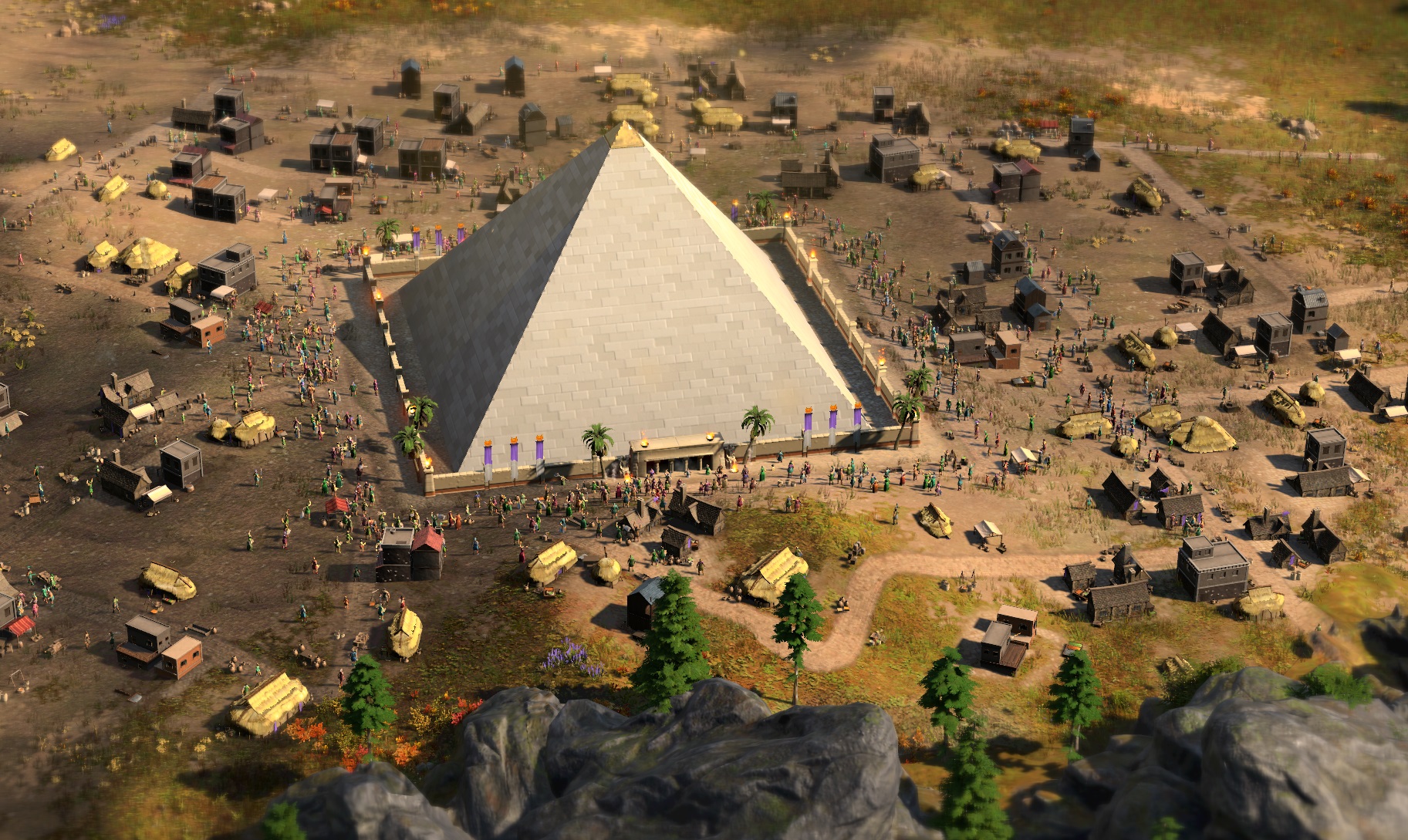Our Verdict
A beautifully presented and accessible game in a sometimes obscure genre, Ara: History Untold is a pretty picture book rather than a deep tome.
PC Gamer's got your back
What is it? History-spanning 4X grand strategy game or: Phil Spencer's Civilization
Expect to pay £50/$60 (included in Game Pass)
Release date September 24, 2024
Developer Oxide Games
Publisher Xbox Game Studios
Reviewed on Intel i7 13700HX, RTX 4080 (mobile), 32GB RAM
Steam Deck Unknown
Link Official site
George Washington and I go way back—around three millennia, give or take a hundred years. He may have been Buddhist while my Korean people were devoted to the pantheon of Hellenic gods, but we traded goods and propelled each other's research, arriving in Ara: History Untold's Era of Antiquity with the world at our feet.
One of our projects was to build a great road between our capitals, but the Ethiopians—whose territory this road was to pass through—refused us access. So George and I flattened Addis Ababa to make way for our old-world trade highway. All was wonderful, but over the centuries our two territories came to fill the void left behind by Ethiopia. We eventually came to share a border and, in a tale as old as Sid Meier, were doomed to become rivals; it was just a question of who would make the land grab first. What George didn't know is that I've been playing 4X games since the original Civilization, and by the time he declared war, my mangonels were at the ready to begin bombarding Jacksonville.
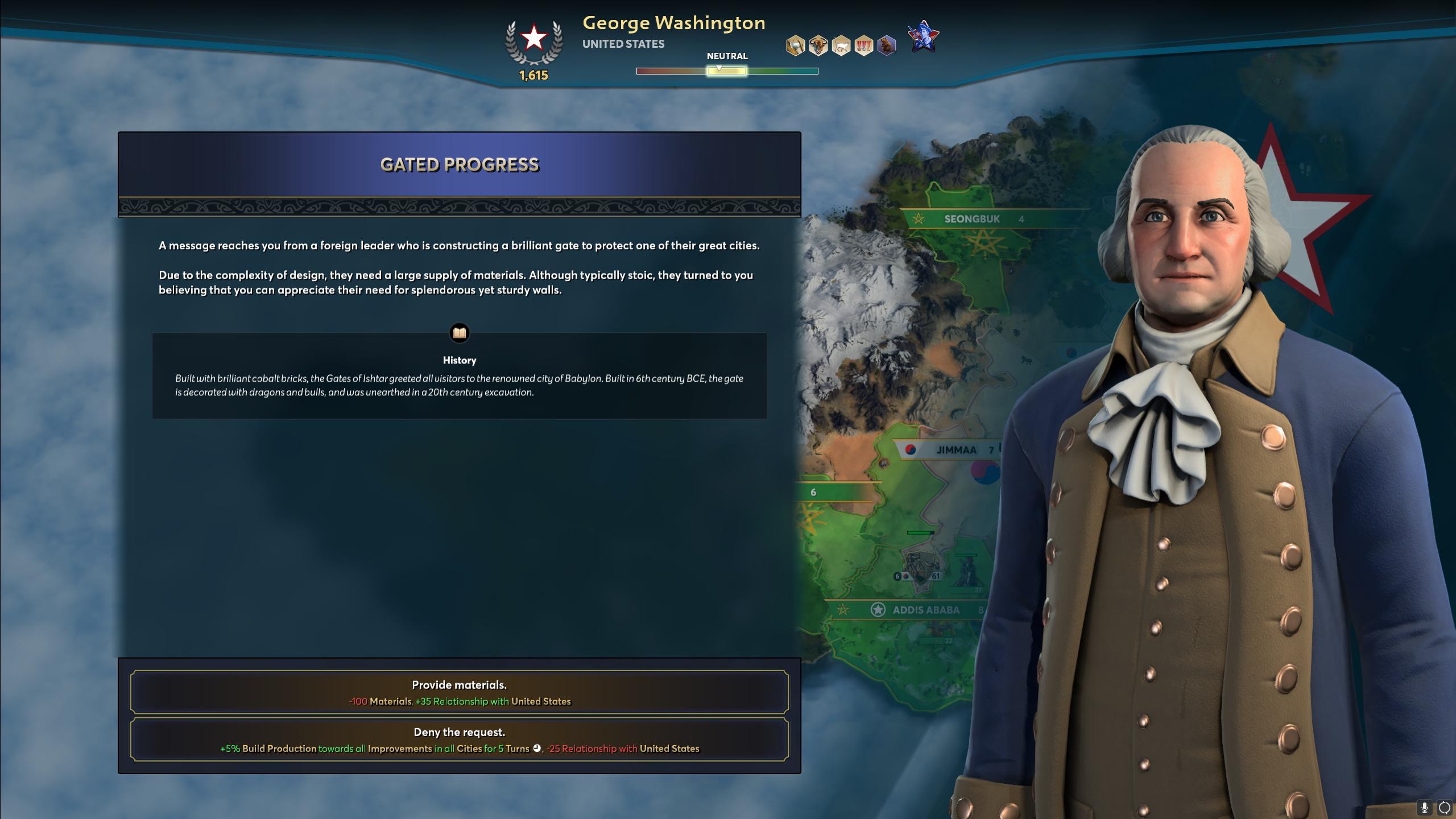
At the macro level, Microsoft and Oxide Games' stab at the Civy-likey turn-based strategy genre is a fine vehicle for the bonkers stories that arise from a randomised alternative history mish-mashing the key people, technological advancements, and nations of our own. For Civ players, the key elements are all there—government types, religion, war, technological progress, diplomacy, and a bunch of familiar features given new names, from wonders (now triumphs) to great works (masterpieces). But at a time when the history-themed 4X genre is looking rather populous, does Ara do enough to stand the test of time?
It certainly makes a jaunt through history visually appealing. Ara is a sight to behold and Oxide Games knows it, which is why it's given us the ability to zoom all the way in to see the life of our great nation up close—hundreds of little folk wandering around towns, tilling the fields, worshipping at temples, dancing jigs in the streets, and going about their daily lives (oh, and there's an inexplicable abundance of raccoons walking among them, for some reason).
In the wilderness, wolves chase deer through the forests and bird flocks fly in formation; in a besieged city, people mindlessly run around in sheer panic while archers or artillery rain hell down on them. Likewise, during battles you can watch fully 3D-rendered simulations each turn. None of these are make-or-break features, but they do give a wonderful sense of scale and liveliness to the world in a genre that can sometimes feel a bit abstracted. Now I've seen this, the thought of going back to the deserted cities of other 4X games seems a tad bleak.
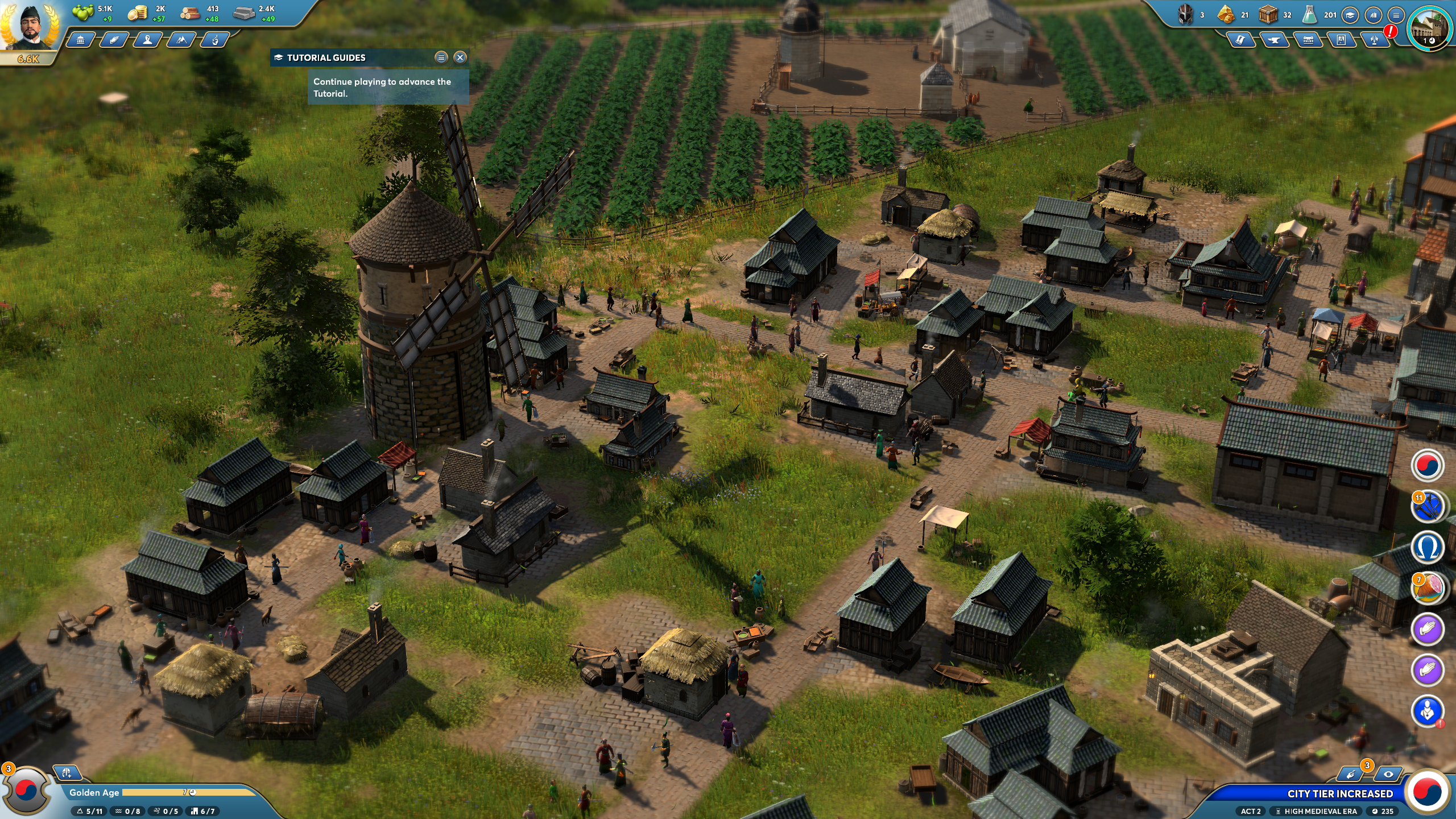
The city-building mechanics are great too. As your city grows, you pick a region to claim, with each region being made up of 2-5 zones that you can place buildings in. You're encouraged to create dedicated districts, as various production buildings—farms, apothecaries, weavers—grant bonuses for having buildings of the same type in the same region. You really have to think about what goes where, and what type of production to focus on given the surrounding resources for your city to thrive. With the help of tiles that follow the contours of the land (as opposed to traditional hexes), cities end up looking organic, with swathes of farmland, busy docklands, bustling traders' districts, and mining regions, not to mention triumphs like the Pyramids, the Great Lighthouse, and (that true marvel of modern engineering), The London Eye, all of which look fantastic.
Ara starts you off at the beginning of human history with a single city. From here you build more cities, gather resources, and meet (and inevitably war with) other civilisations, all while making sure that your key currencies of gold, food, timber, and materials stay in the green. Your goal is to make your civilisation the greatest in human history, taking it on a millennia-long journey from the spearmen of the Ancient Era to—in Ara's case—the mech warriors in the Singularity Era.
Ara applies a couple of deviations to this template. First of all, the game is governed by Prestige, a score that tracks your achievements in areas like military prowess, scientific discovery, religion, culture, and science. The nation with the most Prestige at the end wins, which means Ara isn't just about optimising your strategy towards some singular victory condition. I like this in principle. Having to defend yourself in a war, for example, can be a frustrating waste of time and resources in Civilization, but here if you find yourself beset by conflict, then putting up a resolute defence and preventing the enemy claiming the goals declared in their casus belli will gain you military prestige, adding to your overall Prestige. You can still orient yourself in a certain direction—be it religious superpower or haven for commerce—but it's now viable to switch your focus as the game progresses, while detours into secondary areas of development aren't wasted time.
Divide and conquer
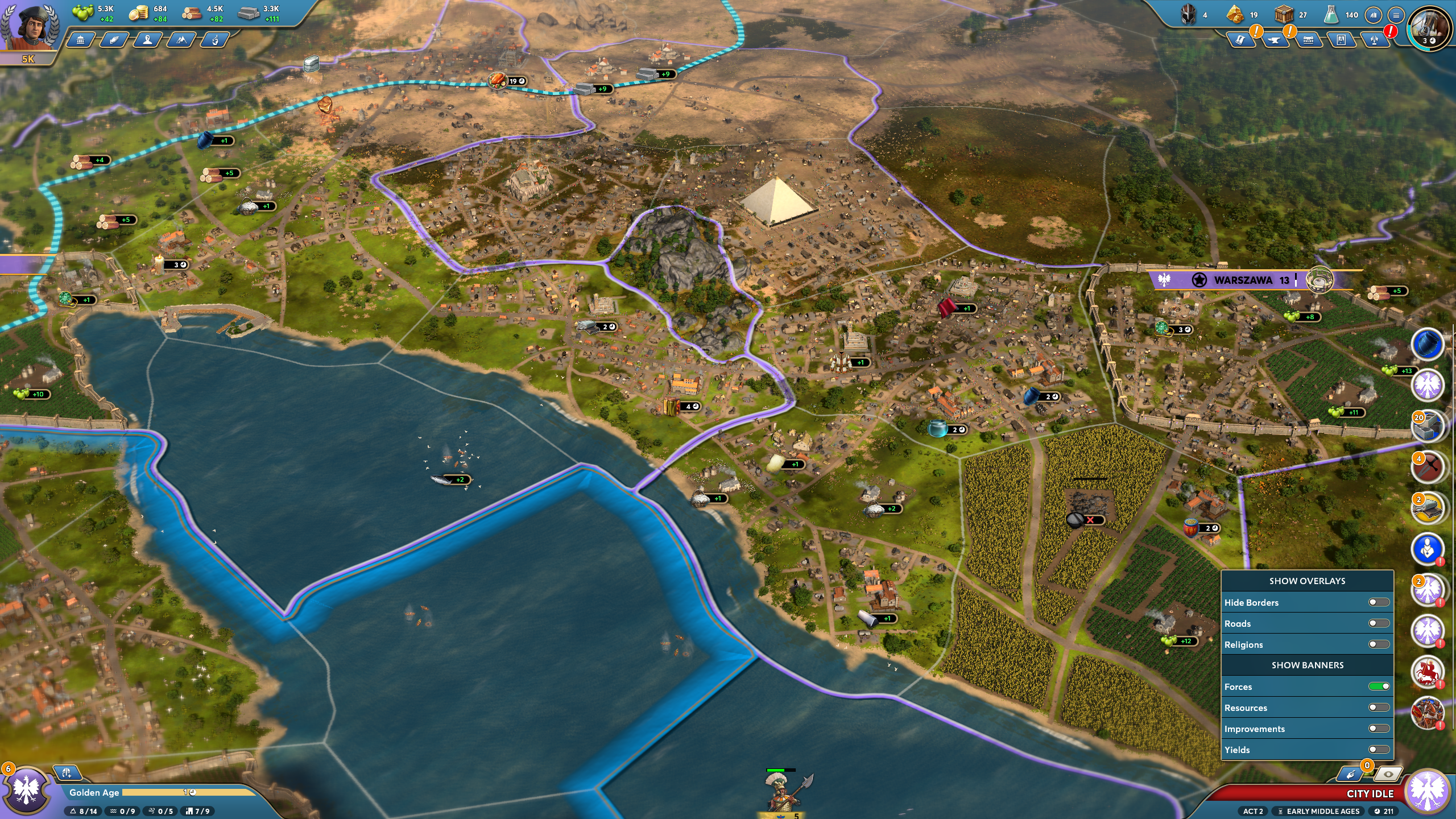
Your journey through history is split into three acts, each made up of four eras which you advance through by researching technologies. The big twist here is that at the end of each act, the civs in the bottom 25% of the Prestige rankings get outright culled from the game—reduced to ruins for the explorers of more successful nations to sift through. If that concept gives you the willies, you can turn it off, but ridiculous though the idea of entire civilisations just vanishing might be for anyone not called Graham Hancock, it gives a good shake-up to your campaign just as it might start stagnating.
Beyond being able to plunder the ruins of lost civs, you suddenly have all this new resource-rich land to expand into, which revives some of the dynamism from the very start of the game when everyone's rushing to establish their early borders. It also offers flagging civs a chance to claw their way back into the game by expanding into swathes of new territory, which addresses the genre bugbear of a game becoming tedious and unwinnable far too early for those who didn't get off to the best start.
Inevitably though, this new land too gets filled, and that frisson of excitement dissipates to reveal to you what Ara is most of the time, which isn't bad exactly, but certainly a bit thin. Diplomacy is threadbare for a start. The fully animated avatars for the game's substantial roster of 36 leaders look great, but lacking in dialogue, they're void of personality. They may as well be mannequins with an unusual hankering for war, even when it's clearly not in their best interest (like trying to capture a city that they have to cross your entire territory to get to). There's no flexibility to negotiations, no way of setting extortionate truce terms, and relationship bars deplete so fast—due largely to a wonky warmonger penalty system—that everyone seems like an enemy to everyone else at all times.
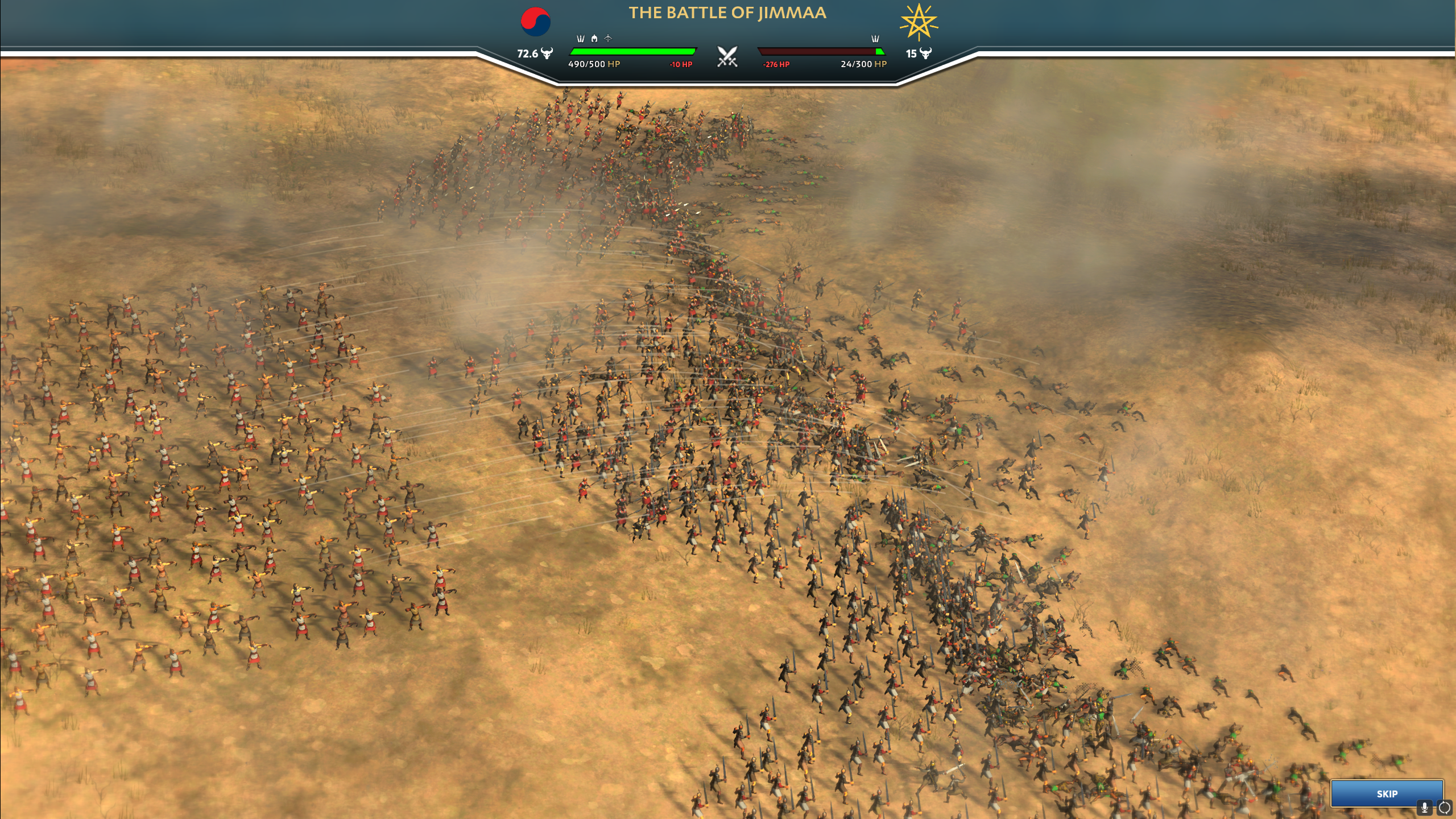
Combat, meanwhile, recalls the 'stacks of doom' of Civilization 4. There's some interesting stuff in terms of arranging stacks into specific formations for combat bonuses, and ranged combat from adjacent tiles allows for a degree of sneaky guerrilla tactics, but for the most part it's 'army with bigger number wins,' with the smaller number getting wiped out. I wish that Ara's irregular-shaped tiles served a more tactical purpose so that crossing a river or attacking units in forested areas would factor into battle calculations, or that you could try to pull back from battles then use terrain, movement, and positioning to overcome numerical disadvantages.
Units level up, but you can't customise or upgrade them to their more modern equivalents, so here too things are a bit too automated. It's lovely watching battles play out in 3D view, but it seems like a bit of a luxury when resources could've been better put to refining the core combat instead; you shouldn't build a palace while the people are starving (I mean, I would and I did in Ara, but that's necessary so I can sit around drinking wine and coming up with pithy proverbs).
Religion is another system that doesn't quite impose itself enough. The bonuses you get for spreading your faith are welcome, but when you send missionaries or oracles to preach in other cities, you don't get to see what turn-by-turn impact they're having on converting other cities, nor does religion feed into diplomatic relations (at least not visibly). While Civ 6 may have been a bit overkill with its priests blasting each other with divine lightning, it at least made the tug-of-war for religious supremacy feel tangible and involved, while here it feels a bit flat.
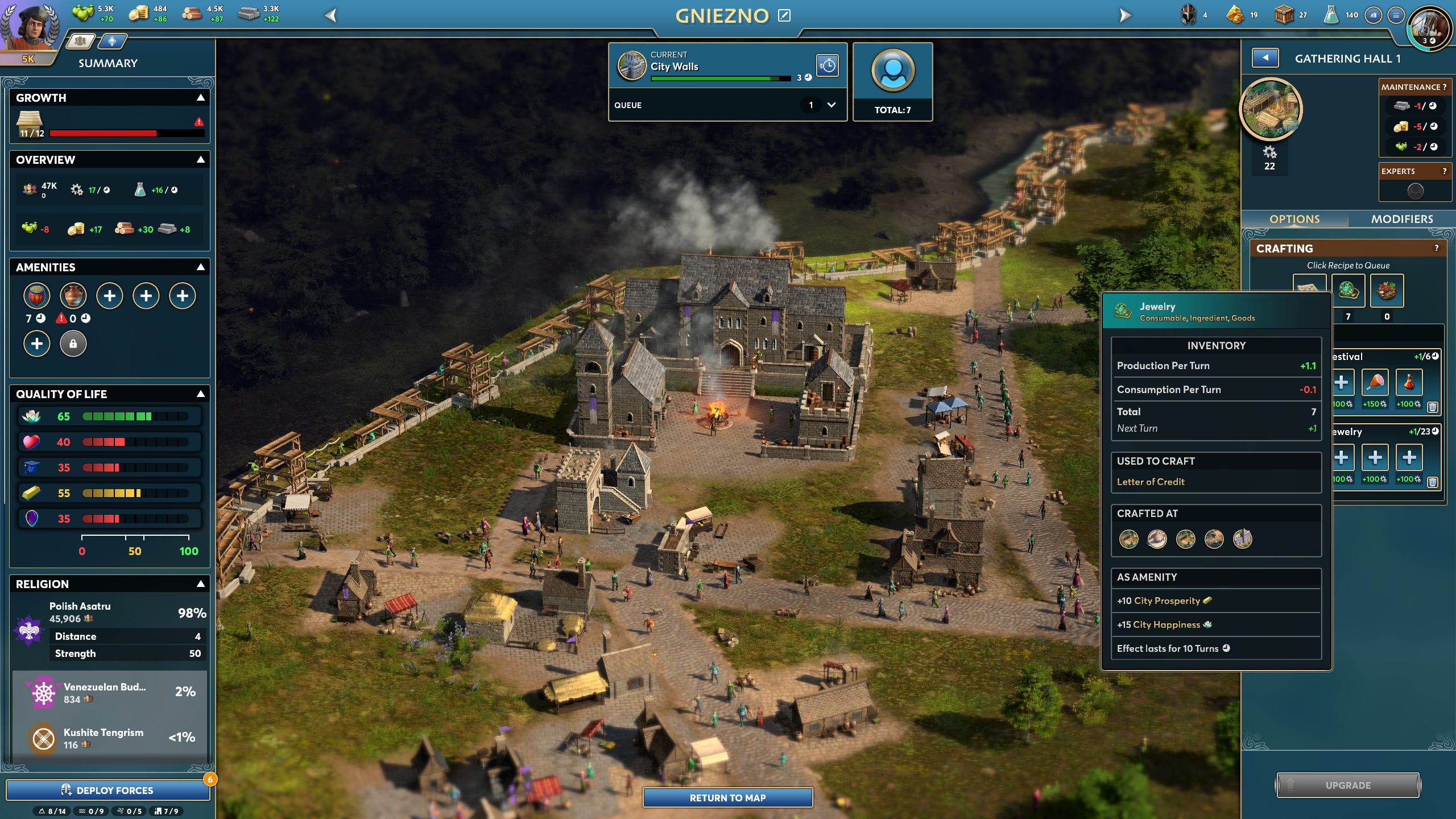
Things get a lot more hands-on with the crafting system. Buildings like bakeries, blacksmiths, and workshops are used to craft items that you then deploy to temporarily boost key city attributes like happiness, health, and city security, or swap in and out of buildings for smaller but long-term city bonuses.
The crafting system is great for drafting things to where they're most needed. The growth of new cities can be vastly accelerated by sending crafted feasts, for instance. If a city is threatened by invasion, meanwhile, send it some of those strategic codices you have stockpiled and you'll boost the strength of forces fighting in its zone of control for 15 turns. But this is one of the only areas where Ara adds complexity rather than stripping it back, and unfortunately the UI isn't well set up to deal with the huge number of interdependent crafting queues you end up with, so it can become a bit of a micromanagement mire in the late game. It's a good idea, with plenty of satisfying use cases, but could do with being less fiddly. In defence of the UI though, it's excellent apart from this blip, with nested menus and popup bubbles linked to highlighted text helping you immediately understand every key term in the game.
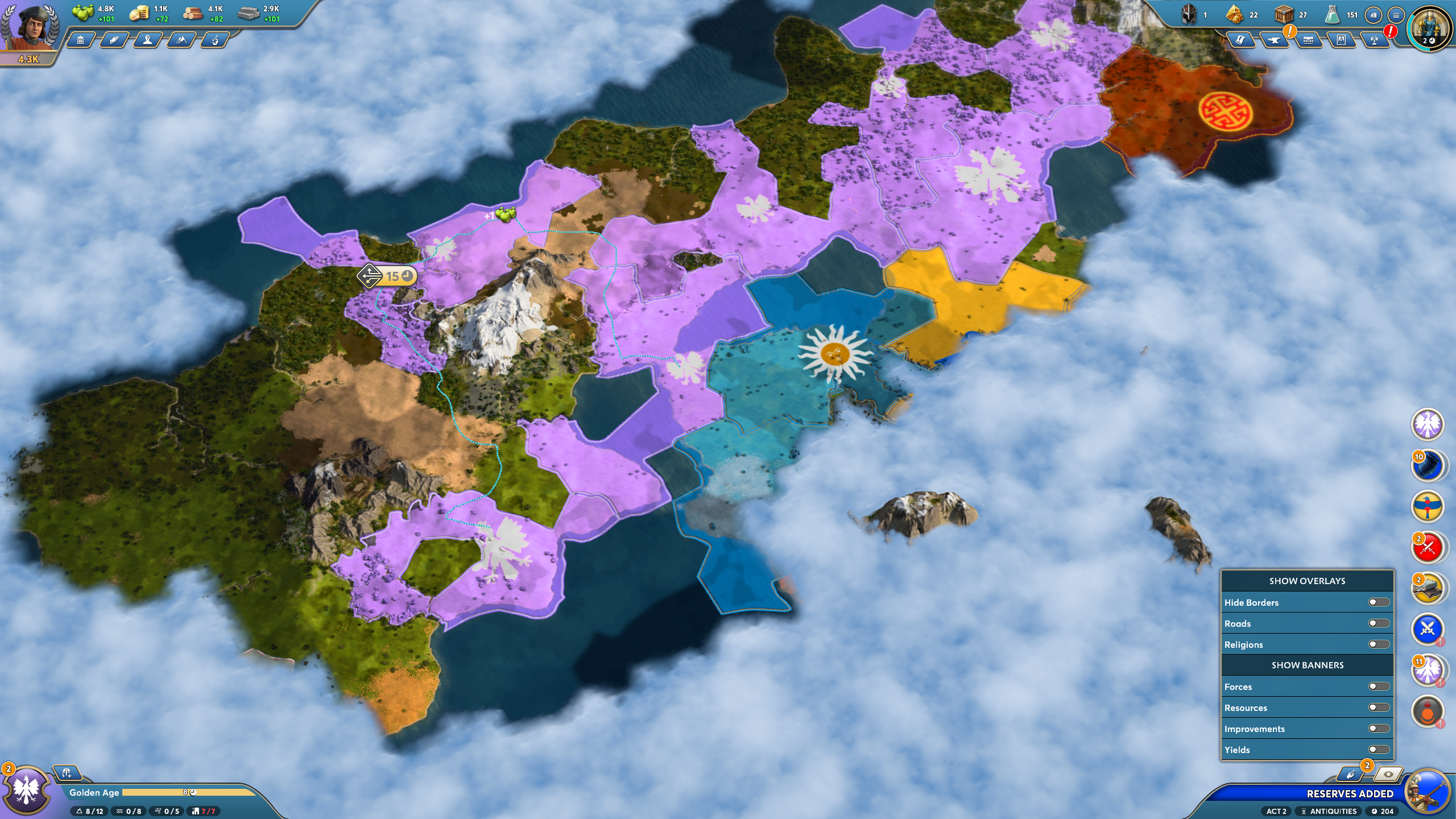
In its current form, Ara is 4X Lite, a pretty princeling next to the great emperors of the genre. But being lightweight has its plus side. It has very little bloat, so the different systems of the game never clash or confuse (a problem for its peers Millennia and Humankind). Combine that with a lovely aesthetic and well integrated info boxes and tooltips, and Ara is a very accessible jaunt for 4X newcomers, if not quite beefy enough to go toe-to-toe with the genre's heavy hitters.
But Rome wasn't built in a day; 4X games tend to be vastly different beasts between initial launch and their final expansion. By playing things safe, Oxide Games has a lot of room through expansions to layer on systems (or expand existing underserved ones, like religion or diplomacy) in a sensible way. This is a fine foray for Microsoft, and even if the history here doesn't exactly feel 'untold', it's told in an eye-catching, engaging way that will keep me clicking the eras for some time yet.
A beautifully presented and accessible game in a sometimes obscure genre, Ara: History Untold is a pretty picture book rather than a deep tome.
Robert is a freelance writer and chronic game tinkerer who spends many hours modding games then not playing them, and hiding behind doors with a shotgun in Hunt: Showdown. Wishes to spend his dying moments on Earth scrolling through his games library on a TV-friendly frontend that unifies all PC game launchers.
